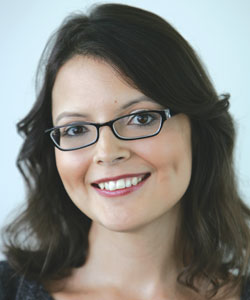Peggy L. St. Jacques

Photo courtesy of Micheline Pelletier
Harvard University
www.people.fas.harvard.edu/~pstjacques
What does your research focus on?
My research examines the cognitive and neural mechanisms that support autobiographical memory; how memory is affected by age and emotion, and how memory retrieval influences how memories are subsequently retrieved.
What drew you to this line of research and why is it exciting to you?
I was drawn to research on autobiographical memory because I love a good story, and what better to study than the stories of our lives. What continues to excite me about research on autobiographical memory are its many puzzles: How do daily moments become part of our autobiography? How can we suddenly remember a long-forgotten memory when provided with an appropriate retrieval cue? How do we sift through the past to retrieve a single event? How does a particularly vivid memory evoke a feeling of mental time travel? How does remembering the past shape the future? And, the biggest puzzle of them all — how are all of these aspects of memory represented in the brain?
Who were/are your mentors or scientific influences?
I have had many wonderful mentors that have influenced and supported me throughout the course of my research career. Brian Levine, my undergraduate thesis advisor at the University of Toronto, was a major influence on my decision to focus on autobiographical memory research. He taught me how to quantitatively analyze the episodic and semantic content of autobiographical narratives, which has strongly guided my theoretical understanding and thinking about autobiographical memory. Brian also suggested that I apply to graduate school at Duke University, where Roberto Cabeza and David C. Rubin jointly mentored me.
Roberto taught me how to interpret and write about functional neuroimaging data and how to understand age-related changes in the brain. David taught me a lot about autobiographical memory and how to run a productive “research factory.” I owe a great deal of my success in science to both Roberto and David, because of their generosity and encouragement.
Daniel L. Schacter, my post-doctoral advisor at Harvard University, has instilled in me the value of perfecting a research question and has provided me with the freedom to pursue those ideas.
I have also been strongly influenced by Morris Moscovitch and Tiffany Chow, with whom I worked as a research assistant before graduate school. Both demonstrated how to be an actively invested mentor. Along the way I have also learnt a great deal from the amazing students and faculty I have interacted with at the University of Toronto, the Rotman Research Institute, Duke University, Harvard University, the Summer Institute in Cognitive Neuroscience (aka “Brain Camp”), and various conferences and workshops.
What’s your future research agenda?
I am currently investigating how remembering the personal past influences subsequent memory retrieval in aging, the neural mechanisms that underlie retrieval-related updating mechanisms, and the role of sleep in supporting retrieval-related changes in memory.
What publication are you most proud of?
St. Jacques P.L., Dolcos F., Cabeza R. (2009). Effects of aging on functional connectivity of the amgydala during subsequent memory for negative pictures: A network analysis of fMRI data. Psychological Science, 20, 74–84.
I am most proud of this publication because of several reasons: 1) the research findings were some of the first on the neural mechanisms of age-related changes in emotional memory, 2) I learnt a great deal about functional MRI analysis in the process, and 3) it was the result of a great amount of determination and effort.





APS regularly opens certain online articles for discussion on our website. Effective February 2021, you must be a logged-in APS member to post comments. By posting a comment, you agree to our Community Guidelines and the display of your profile information, including your name and affiliation. Any opinions, findings, conclusions, or recommendations present in article comments are those of the writers and do not necessarily reflect the views of APS or the article’s author. For more information, please see our Community Guidelines.
Please login with your APS account to comment.